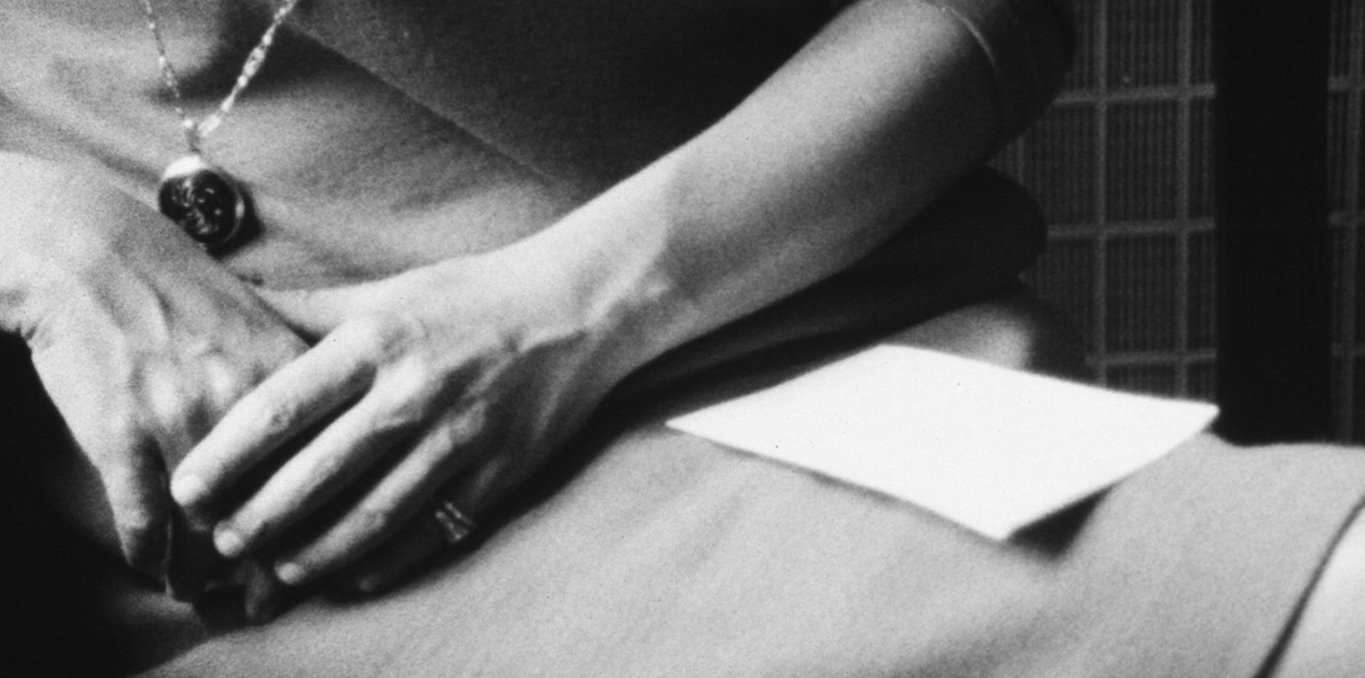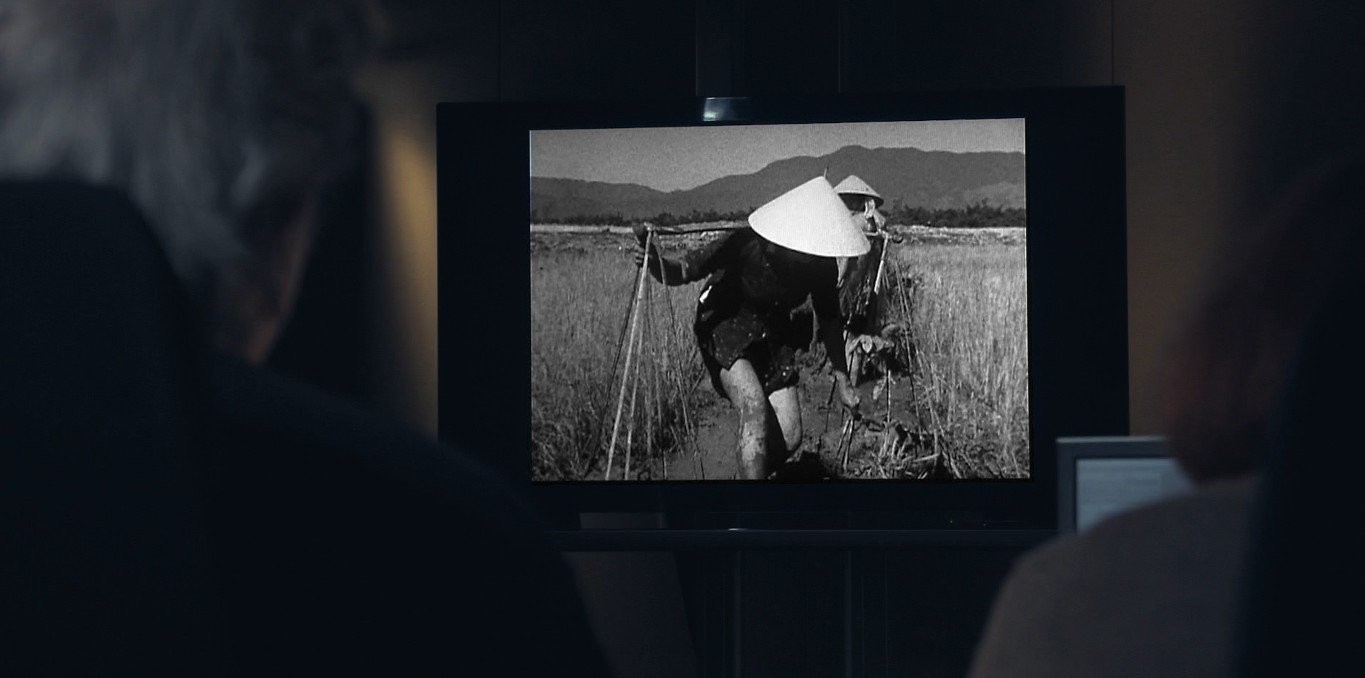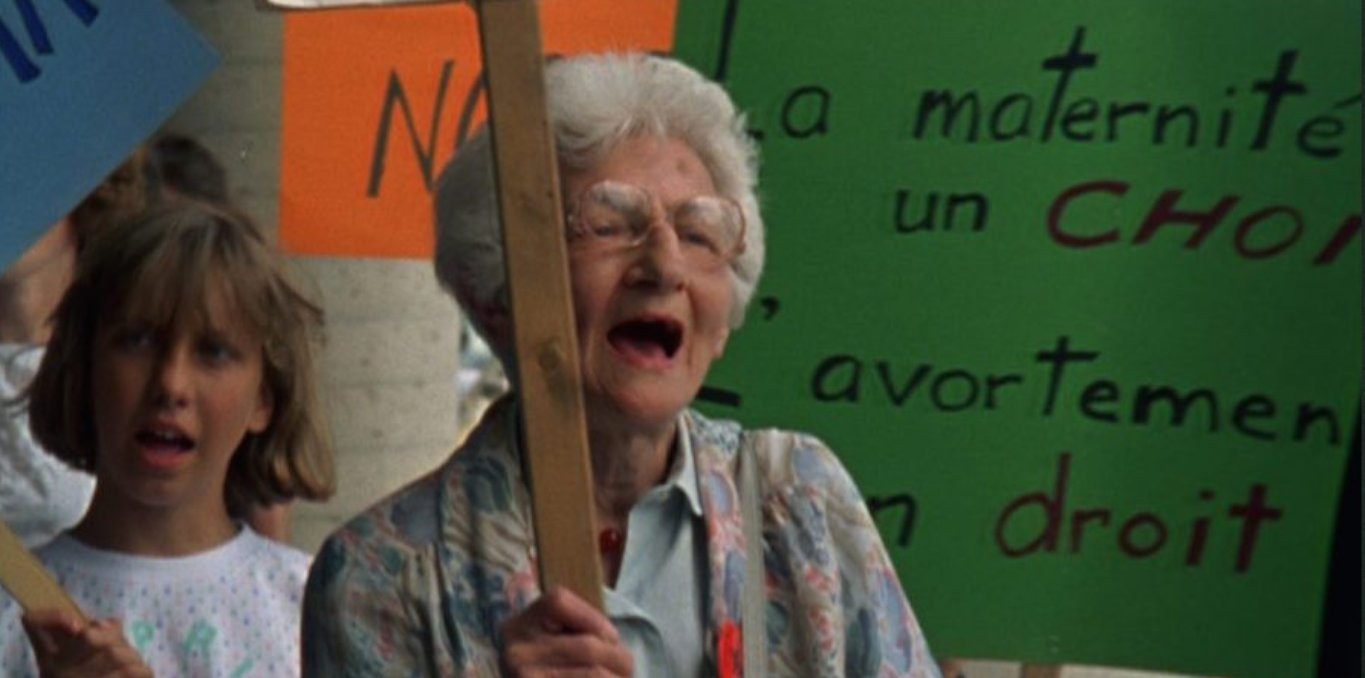Real Talks

Documentary films centered on cerebration and contemporary research, in the form of interviews with scholars, philosophers and artists whose work shed light on our times.
47 products

Femmes écrivains
Subscription access
Françoise Sagan, Clara Malraux, Henriette Jelinek, and Françoise Mallet-Joris share their vision of literature and discuss the reasons that drive them to write.

Cinéma documentaire : fragments d'une histoire
Cinéma documentaire : fragments d'une histoire
Subscription accessDrawing from the images of the last century, from those of Louis Lumière (1895) to those of Yann Le Masson (1973), this film is a subjective journey through the history of cinema, particularly documentary... Comolli willingly summons through quotation Robert Flaherty, Dziga Vertov, Jean Rouch, Mario Ruspoli, Robert Drew, Johan Van der Keuken, Maurice Pialat, Guy Debord, Joris Ivens, Luis Buñuel...

A Vision in the Darkness
Léa Roback, her life, her work, her commitment. Through the “lights” of Léa Roback, a Jewish activist from Quebec who was a feminist, trade unionist, pacifist, and communist, *A Vision in the Darkness* offers a modernist vision of Quebec's history, from the early 20th century to the Duplessis years of the Grande Noirceur (Great Darkness).

To Hell With Culture
Co-founder of the Institute of Contemporary Arts, Herbert Read (1893-1968) was an influential art critic, poet and committed anarchist. In his 1943 essay, _To Hell with Culture_, Read laid out his ideas for a civilisation based on cooperation in which culture would no longer be a commodity, separated from society, but an integral part of everyday life. In this film, director Huw Wahl engages in...

Old Age and Hope
When old age inflicts physical and sometimes mental decay, is there a way to remain hopeful towards life and its mysteries? This documentary tackles this question by challenging not only specialists such as geriatricians, gerontologists, psychologists, and philosophers but first and foremost the elderly themselves.

Pierre Perrault : l'action parlée
Pierre Perrault : l'action parlée
Duration: 52 minutesSubscription access
A documentary about Quebec filmmaker Pierre Perrault (1927-1999), a pioneer of direct cinema, filmed as part of the French television series _Cinéastes de notre temps_ in 1968. Using a lightweight camera and synchronized sound, Perrault employed modern techniques to explore the traditions of the Quebec people. Here, he talks about the making of his films about the inhabitants of Île-aux-Coudres...

En passant par le Québec
Subscription access
Isolated and marginalized, Quebec cinema has long existed thanks to the commitment and energy of its creators, who devote themselves – from documentary to fiction – to a creative cinema that is sometimes serious, sometimes offbeat, bearing witness to Quebec's identity and social problems. In August 1967, the cult TV program _Cinéastes de notre temps_ interviewed directors Arthur Lamothe, Michel...

Il était une fois Françoise Dolto - Part 2
Il était une fois Françoise Dolto - Part 2
Duration: 0h59Subscription access
These conversations with renowned pediatrician and psychoanalyst Françoise Dolto were recorded in 1986, two years before her death. With her unique perspective on childhood, her humour, and her unparalleled talent for simplifying psychoanalytic theories, Dolto helped change the way society views children.

Il était une fois Françoise Dolto - Part 1
Il était une fois Françoise Dolto - Part 1
Duration: 0h59Subscription access
These conversations with renowned pediatrician and psychoanalyst Françoise Dolto were recorded in 1986, two years before her death. With her unique perspective on childhood, her humour, and her unparalleled talent for simplifying psychoanalytic theories, Dolto helped change the way society views children.

Dis-moi
Subscription access
Echoing her own mother's voice recounting her relationships with her mother and grandmother, filmmaker Chantal Akerman visits three elderly Jewish women and asks them to speak about their ancestors. Seated in their living rooms and filmed in static shots, these grandmothers share their memories, the life of Jewish communities before the war, the Holocaust, and the efforts to survive the horror....

Marguerite Duras and the '68ers
Marguerite Duras and the '68ers
Duration: 8 minutesTwo months before May 68, the program _Dim Dam Dom_ focuses on the growing revolt among students. Romain Goupil, 16 years old, expelled from school, discusses with Marguerite Duras. Why do we engage in politics at such a young age? Does politics prevent you from working well? What is politics?

Marguerite Duras : du mot à l'image
Marguerite Duras : du mot à l'image
Duration: 23 minutesSubscription access
Marguerite Duras is interviewed at her home about the photographic illustration of her novel _Le ravissement de Lol V. Stein_. She reads excerpts from the book.

The Law in These Parts
Subscription access
_The Law in These Parts_ reveals the legal framework of Israel’s occupation of the Palestinian territories and exposes the injustices inherent in a legal system designed by Israel but applied only to Palestinians. Through archival footage and interviews with Israeli military judges, prosecutors, and legal advisors, this documentary unravels an intricate system of military control that symbolize...

Anaïs Nin
Subscription access
In this interview with Fernand Seguin, the famous writer reveals the main aspects of her personality by reflecting on the different stages of her life. Anaïs Nin recounts her life and the simultaneous process of writing her journal for fifty years. She talks about her youth, her complicated relationship with her father, and her pivotal encounters with many famous artists such as Henry Miller an...

Portrait d'Edgar Varèse
Subscription access
Interview with the Quebecois poet, novelist, and essayist Fernand Ouellette about his book on musician Edgar Varèse. He explains how he came to write the book, talks about his love for Varèse, the role of the machine in his music, the audience's reception... All interspersed with rare excerpts from interviews with Edgar Varèse.

Francis Bacon, peintre anglais
Francis Bacon, peintre anglais
Duration: 22 minutesPapers, photographs, sketches, tubes of paint and canvases litter Francis Bacon's London studio. It's a place where friends, lovers and eccentric figures pass through, haunting his canvases after a mysterious creative alchemy. Bacon explains in French his carnal relationship with his canvases, the painters who inspire him, and his relationship with alcohol, violence and death. He talks about hi...

Rome is Burning : Portrait of Shirley Clarke
Rome is Burning : Portrait of Shirley Clarke
Duration: 1h46Subscription access
Is subversion soluble in cinema? Are militant films effective? How do you shoot outside the "system"? American "underground" filmmaker Shirley Clarke answers these questions in 1968.

Thank God I'm a Lesbian
Twelve Canadian, American and French lesbians of various ages, colours and cultures talk candidly and humorously about the many aspects of the lesbian identity. Far from being dogmatic, this documentary is an upbeat series of standpoints.

Six fois deux, sur et sous la communication - Épisode 2b : Jean-Luc
Six fois deux, sur et sous la communication - Épisode 2b : Jean-Luc
Duration: 48 minutesSubscription access
Facing the camera, Godard discusses with a journalist from _Libération_ (off-screen, from behind) work, cinema, and television. Texts scroll across the screen. Little by little, Godard tries to explain what he is trying to communicate by creating this series and defining its limits.

The Monopoly of Violence
As anger and resentment grow in the face of social inequalities in France, many citizen-led protests are being repressed with ever-increasing violence. In _The Monopoly of Violence_, David Dufresne gathers a panel of citizens to question, exchange and confront their views on the social order and the legitimacy of the use of force by the State.

Femmes écrivains
Subscription access
Françoise Sagan, Clara Malraux, Henriette Jelinek, and Françoise Mallet-Joris share their vision of literature and discuss the reasons that drive them to write.

Cinéma documentaire : fragments d'une histoire
Cinéma documentaire : fragments d'une histoire
Subscription accessDrawing from the images of the last century, from those of Louis Lumière (1895) to those of Yann Le Masson (1973), this film is a subjective journey through the history of cinema, particularly documentary... Comolli willingly summons through quotation Robert Flaherty, Dziga Vertov, Jean Rouch, Mario Ruspoli, Robert Drew, Johan Van der Keuken, Maurice Pialat, Guy Debord, Joris Ivens, Luis Buñuel...

A Vision in the Darkness
Léa Roback, her life, her work, her commitment. Through the “lights” of Léa Roback, a Jewish activist from Quebec who was a feminist, trade unionist, pacifist, and communist, *A Vision in the Darkness* offers a modernist vision of Quebec's history, from the early 20th century to the Duplessis years of the Grande Noirceur (Great Darkness).

To Hell With Culture
Co-founder of the Institute of Contemporary Arts, Herbert Read (1893-1968) was an influential art critic, poet and committed anarchist. In his 1943 essay, _To Hell with Culture_, Read laid out his ideas for a civilisation based on cooperation in which culture would no longer be a commodity, separated from society, but an integral part of everyday life. In this film, director Huw Wahl engages in...

Old Age and Hope
When old age inflicts physical and sometimes mental decay, is there a way to remain hopeful towards life and its mysteries? This documentary tackles this question by challenging not only specialists such as geriatricians, gerontologists, psychologists, and philosophers but first and foremost the elderly themselves.

Pierre Perrault : l'action parlée
Pierre Perrault : l'action parlée
Duration: 52 minutesSubscription access
A documentary about Quebec filmmaker Pierre Perrault (1927-1999), a pioneer of direct cinema, filmed as part of the French television series _Cinéastes de notre temps_ in 1968. Using a lightweight camera and synchronized sound, Perrault employed modern techniques to explore the traditions of the Quebec people. Here, he talks about the making of his films about the inhabitants of Île-aux-Coudres...

En passant par le Québec
Subscription access
Isolated and marginalized, Quebec cinema has long existed thanks to the commitment and energy of its creators, who devote themselves – from documentary to fiction – to a creative cinema that is sometimes serious, sometimes offbeat, bearing witness to Quebec's identity and social problems. In August 1967, the cult TV program _Cinéastes de notre temps_ interviewed directors Arthur Lamothe, Michel...

Il était une fois Françoise Dolto - Part 2
Il était une fois Françoise Dolto - Part 2
Duration: 0h59Subscription access
These conversations with renowned pediatrician and psychoanalyst Françoise Dolto were recorded in 1986, two years before her death. With her unique perspective on childhood, her humour, and her unparalleled talent for simplifying psychoanalytic theories, Dolto helped change the way society views children.

Il était une fois Françoise Dolto - Part 1
Il était une fois Françoise Dolto - Part 1
Duration: 0h59Subscription access
These conversations with renowned pediatrician and psychoanalyst Françoise Dolto were recorded in 1986, two years before her death. With her unique perspective on childhood, her humour, and her unparalleled talent for simplifying psychoanalytic theories, Dolto helped change the way society views children.

Dis-moi
Subscription access
Echoing her own mother's voice recounting her relationships with her mother and grandmother, filmmaker Chantal Akerman visits three elderly Jewish women and asks them to speak about their ancestors. Seated in their living rooms and filmed in static shots, these grandmothers share their memories, the life of Jewish communities before the war, the Holocaust, and the efforts to survive the horror....

Marguerite Duras and the '68ers
Marguerite Duras and the '68ers
Duration: 8 minutesTwo months before May 68, the program _Dim Dam Dom_ focuses on the growing revolt among students. Romain Goupil, 16 years old, expelled from school, discusses with Marguerite Duras. Why do we engage in politics at such a young age? Does politics prevent you from working well? What is politics?

Marguerite Duras : du mot à l'image
Marguerite Duras : du mot à l'image
Duration: 23 minutesSubscription access
Marguerite Duras is interviewed at her home about the photographic illustration of her novel _Le ravissement de Lol V. Stein_. She reads excerpts from the book.

The Law in These Parts
Subscription access
_The Law in These Parts_ reveals the legal framework of Israel’s occupation of the Palestinian territories and exposes the injustices inherent in a legal system designed by Israel but applied only to Palestinians. Through archival footage and interviews with Israeli military judges, prosecutors, and legal advisors, this documentary unravels an intricate system of military control that symbolize...

Anaïs Nin
Subscription access
In this interview with Fernand Seguin, the famous writer reveals the main aspects of her personality by reflecting on the different stages of her life. Anaïs Nin recounts her life and the simultaneous process of writing her journal for fifty years. She talks about her youth, her complicated relationship with her father, and her pivotal encounters with many famous artists such as Henry Miller an...

Portrait d'Edgar Varèse
Subscription access
Interview with the Quebecois poet, novelist, and essayist Fernand Ouellette about his book on musician Edgar Varèse. He explains how he came to write the book, talks about his love for Varèse, the role of the machine in his music, the audience's reception... All interspersed with rare excerpts from interviews with Edgar Varèse.

Francis Bacon, peintre anglais
Francis Bacon, peintre anglais
Duration: 22 minutesPapers, photographs, sketches, tubes of paint and canvases litter Francis Bacon's London studio. It's a place where friends, lovers and eccentric figures pass through, haunting his canvases after a mysterious creative alchemy. Bacon explains in French his carnal relationship with his canvases, the painters who inspire him, and his relationship with alcohol, violence and death. He talks about hi...

Rome is Burning : Portrait of Shirley Clarke
Rome is Burning : Portrait of Shirley Clarke
Duration: 1h46Subscription access
Is subversion soluble in cinema? Are militant films effective? How do you shoot outside the "system"? American "underground" filmmaker Shirley Clarke answers these questions in 1968.

Thank God I'm a Lesbian
Twelve Canadian, American and French lesbians of various ages, colours and cultures talk candidly and humorously about the many aspects of the lesbian identity. Far from being dogmatic, this documentary is an upbeat series of standpoints.

Six fois deux, sur et sous la communication - Épisode 2b : Jean-Luc
Six fois deux, sur et sous la communication - Épisode 2b : Jean-Luc
Duration: 48 minutesSubscription access
Facing the camera, Godard discusses with a journalist from _Libération_ (off-screen, from behind) work, cinema, and television. Texts scroll across the screen. Little by little, Godard tries to explain what he is trying to communicate by creating this series and defining its limits.

The Monopoly of Violence
As anger and resentment grow in the face of social inequalities in France, many citizen-led protests are being repressed with ever-increasing violence. In _The Monopoly of Violence_, David Dufresne gathers a panel of citizens to question, exchange and confront their views on the social order and the legitimacy of the use of force by the State.
